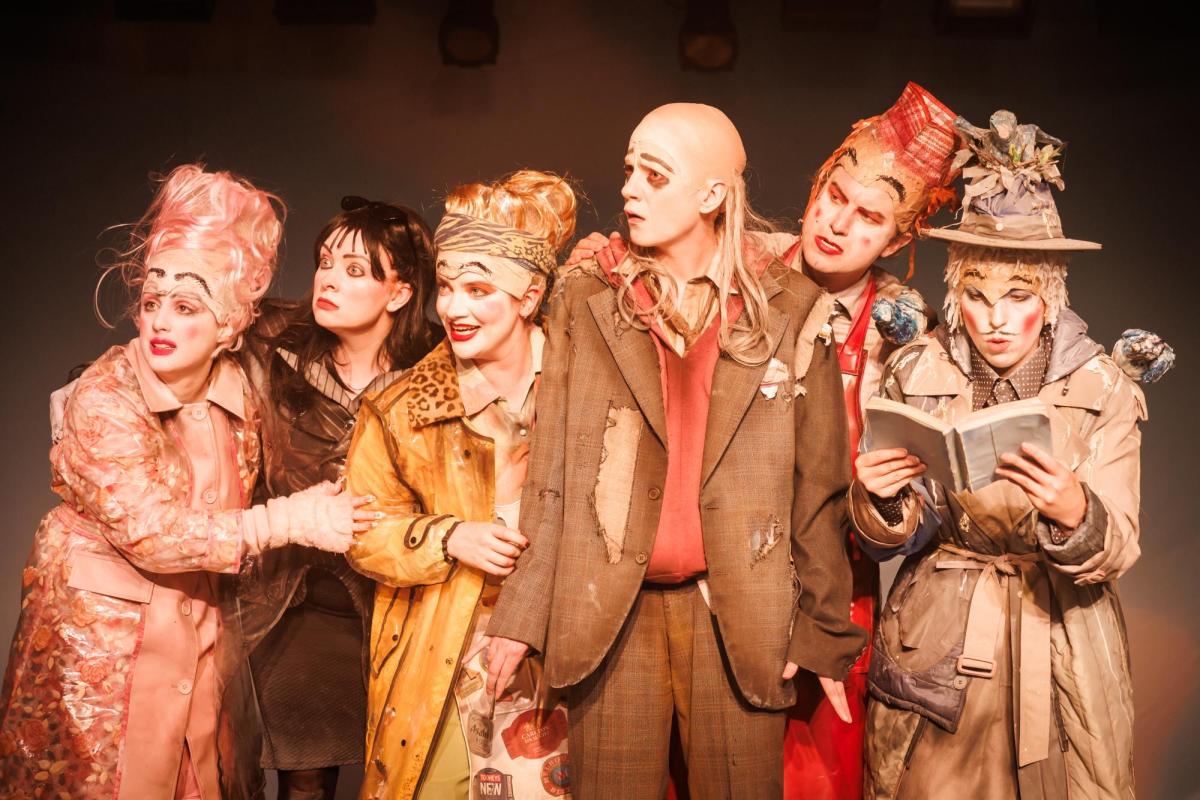Rhinoceros is the second instalment in Spinning Plates’ Beast Trilogy, following 2023’s acclaimed production of The Crocodile, a refigured short story by Dostoyevsky. The cast and crew return with renewed energy and vim in this quasi-allegorical play by Romanian-born French playwright Eugène Ionesco and adapted by Zinnie Harris (Meet me at Dawn, Macbeth: An Undoing) – who, incidentally, has had a good run on Australian stages this year.
First performed in 1959, Rhinoceros is a commentary on the rise of fascism and its development into Nazism, as well as the attendant dangers of mass conformity. The narrative is set in a small provincial French town where the residents begin turning into rhinoceroses one by one – except for the protagonist Bérenger.
The Spinning Plates crew lean brilliantly into Ionesco’s Theatre of the Absurd, where logic, realism and traditional character development are eschewed, with a focus instead on individuals navigating an incomprehensible world. Rhinoceros exemplifies this directive, beginning as a farce that darkens into a tragedy.
Aside from scrunched up paper in large pits on either side, the stage for the first act is bare: all the better to admire the patched-up handiwork of costume designer Dann Barber, who, as though in a stylised fever dream, puts the cast into a colourful array of fabric and accessories, complemented with equally outlandish clown-like make-up and hair. The hidden trapdoors on stage allow them to drop down and crawl up at opportune moments, providing many moments of slapdash physical humour.
The dialogue is full of oddities and non-sequiturs – instead of railing against the marauders, the townspeople have arguments about whether the rhinos have one or two horns and their country of origin. Perhaps this was Ionesco’s way of implying how – when faced with threat from outside – people often prevaricate and argue among themselves instead of actually doing something productive and fighting these intruders.
It’s clever too how innocuously it all begins, before events escalate in violence. The first sighting of one creature feels like an anomaly, a couple seem harmless enough just running through the streets. But, before long, a pet cat is trampled over and then property is occupied and people are attacked. This slow progression lulls everyone into a false sense of security that the rhinos will simple disappear instead of confronting the fact that they are growing in number and vastly overtaking the humans.
Rachel Lewindon’s soundscape calls forth the thundering stampede of the pachyderms, as the town succumbs to ‘rhinoceritis’: an infectious illness that picks off the villagers one by one as they start to grow a horn between their foreheads, a thick hide and aggressive tendencies. (The actual scenes of transformation are adeptly handled, complete with convincing trumpeting.)
This metaphor of beastly conversion of course aligns with the message Ionesco was trying to convey: the insidious spread of extreme ideologies – in this case fascism – that infects ordinary citizens. The rhinos are a symbol of the mass hysteria indoctrination and propaganda that can affect even the sanest and most learned individual, as represented in this play by the Logician,and Bérenger’s clever, cultured friend Jean.
All the cast, who play multiple characters, acquit their roles brilliantly, with perhaps special mention to Cait Spiker who plays the lone human survivor. The beauty of Bérenger is that at first he seems like an anti-hero: frequently sozzled, unkempt and a bit of a simpleton. Bérenger nonetheless prevails against the madding crowd and resists their herd behaviour, with Spiker capturing his fecklessness, confusion and – as the last man standing – his reluctance, but determination to hold onto his own sense of identity and morality.
The 90-minute duration is just the right amount of time for the ensemble to create chaos and paranoia on stage, without any faltering in the narrative pacing.
With the US elections in full swing, and the possible advent of Trump making his way back to the fore, the staging of Rhinoceros cannot be more resonant.
Look how easy it is, Ionesco is saying, for people to support totalitarian regimes. Not many can withstand the force or the pressure of the majority. So, as the play posits: watch how your co-worker, your boss, your neighbour, your friend and even your love interest can buy into a dehumanising belief system.
Read: Theatre review: William Shakespeare’s Reservoir Dogs, St Martin’s Theatre
Spinning Plates Co has done it again; this cautionary tale is entertaining and edifying as well as being aesthetically inventive and directorially adroit.
Rhinoceros by Eugène Ionesco
fortyfivedownstairs
Presented by Spinning Plates Co
Adapted by by Zinnie Harris
Director: Cassandra Fumi
Assistant Director: Alexandra Aldrich
Set Design: Dann Barber and Jacob Battista
Stage Manager: Georgina Bright
Assistant Stage Manager: Bridget Sweeney
Costume Design: Dann Barber
Lighting Designer: Rachel Burke
Sound Artist: Rachel Lewindon
Design Associates: Jonel Factor, Spencer Herd, Ashley Reid
Cast: Belinda Anderson-Hunt, James Cerché, John Marc Desengano, Joey Lai, Zachary Pidd, Cait Spiker, Jessica Stanley. Annabelle Tudor
Rhinoceros will be performed until 17 November 2024.




